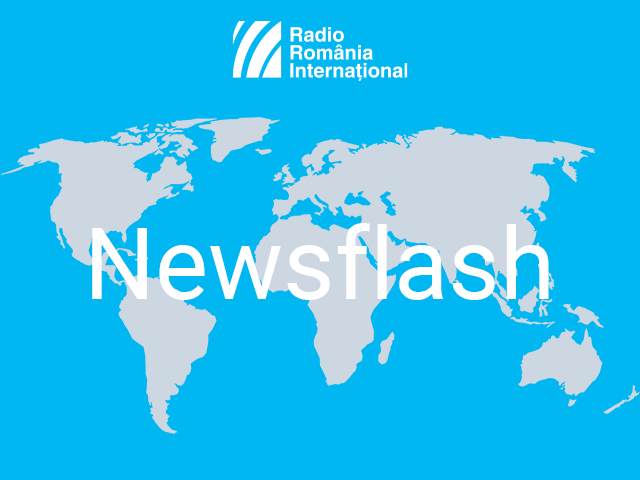January 2, 2022
A roundup of news from Romania

Newsroom, 02.01.2022, 13:54
Covid — 958 new cases of SARS-CoV-2 infection have been registered in the last 24 hours in Romania, alongside 17 deaths – the Strategic Communication Group announced on Sunday. Health experts say that the 5th pandemic wave will reach Romania in the first weeks of 2022 and estimate that a threshold of 25,000 infections per day could be reached. The PM Nicolae Ciuca said that the law on the introduction of the so-called COVID green certificate could be adopted either in a special session of parliament or by government decree. Since the onset of the pandemic, over 1.8 million cases of COVID-19 have been registered in Romania, and almost 60,000 people diagnosed with the novel coronavirus have died. The country has the second lowest vaccination rate among the 27 EU members, after Bulgaria. Less than 7.9 million Romanians have been fully vaccinated, that is a little over 40% of the eligible population. About two million of them have been vaccinated with the so-called booster dose.
Finance — For January 2022 the Romanian Finance Ministry planned loans from commercial banks worth 4.4 billion lei, of which 300 million lei through the issuance of discounted treasury bonds and 4.1 billion lei through ten government bond issues. Adding to these could be the amount of 615 million lei, through additional sessions of non-competitive offers, related to bond auctions. The total amount of 5.015 billion lei (the equivalent of over one billion Euros) will be used to refinance the public debt and to finance the state budget deficit.
Handball — Romanias national mens handball team starts training for the preliminary qualifying tournament for the World Championship, to be held in Cluj-Napoca (northwest). Between January 7-9, 2022, the Romanian handballers will meet the national teams of Israel, Cyprus and the Republic of Moldova, opponents considered accessible by the specialized press. Last week, Romania played, also in Cluj, two training matches with the Turkish national team, which it won 26-24 and 35-25, respectively. The friendly matches replaced, in the schedule of the two teams, a new edition of the traditional Carpathian Trophy, which was canceled, after numerous players contaminated with COVID-19 were identified in the groups of the other two participants, Switzerland and Iran. Romanias coach is the famous Spanish coach Xavi Pasqual, who won the Champions League with Barcelona three times.
Pay rise — Since January 1, the minimum gross salary in Romania has increased to 2,550 lei (the equivalent of about 510 Euros), the pension point to 1,586 lei (320 Euros), and the minimum social allowance increased to 1,000 lei (200 Euros). Allowances for children aged 2 to 18 also increased to 243 lei (about 49 Euros), and to 600 lei (about 120 Euros) for children up to two years or up to three years in the case of disabled children. However, the level of excise duties for almost all product categories – petrol, diesel oil, beer, wine and spirits – is also increasing, the only exception being for cigarettes. For the approximately 3.7 million consumers who have not yet concluded a free-market contract, electricity tariffs increase by 50 up to 90%, depending on the supplier, but people will not pay increased bills now, because they have been capped and will be compensated from the state budget until March 31, 2022. Analysts warn that increases in pensions and salaries will not be felt by the population, tough, as these increases come in the context of price rises, which will continue in the next period.
Energy – Romanian energy experts expect the Romgaz National Natural Gas Company to sign, this spring, the contract to take over the shares of the American operator ExxonMobil in the Neptune Deep perimeter of the Black Sea, which would ensure Romanias energy independence for many years. The Neptune Deep perimeter in the Black Sea has the largest gas reserve discovered so far off the Romanian coast, which is estimated at over 80 billion cubic meters and having an uncertain potential of up to 200 billion. Given that today Romanias consumption is up to 12 billion cubic meters per year, this perimeter is the equivalent of the national consumption for at least eight years. According to initial plans, with the start of operations, Neptun Deep could provide two billion cubic meters of gas in the first year, just enough for Romania to become independent of imports. Production is going to increase annually to six billion, after which it will decrease with the gradual depletion of the gas amount in the depths. The shareholders of Romgaz, a company owned by the Romanian state, have already approved this takeover and thus the company will become an equal partner, within the Neptun Deep project, with another company partly owned by the Romanian state, Petrom. Following the expected change in the offshore law, gas exploration in the Neptune Deep perimeter could begin in 2026-2027. (LS)




























